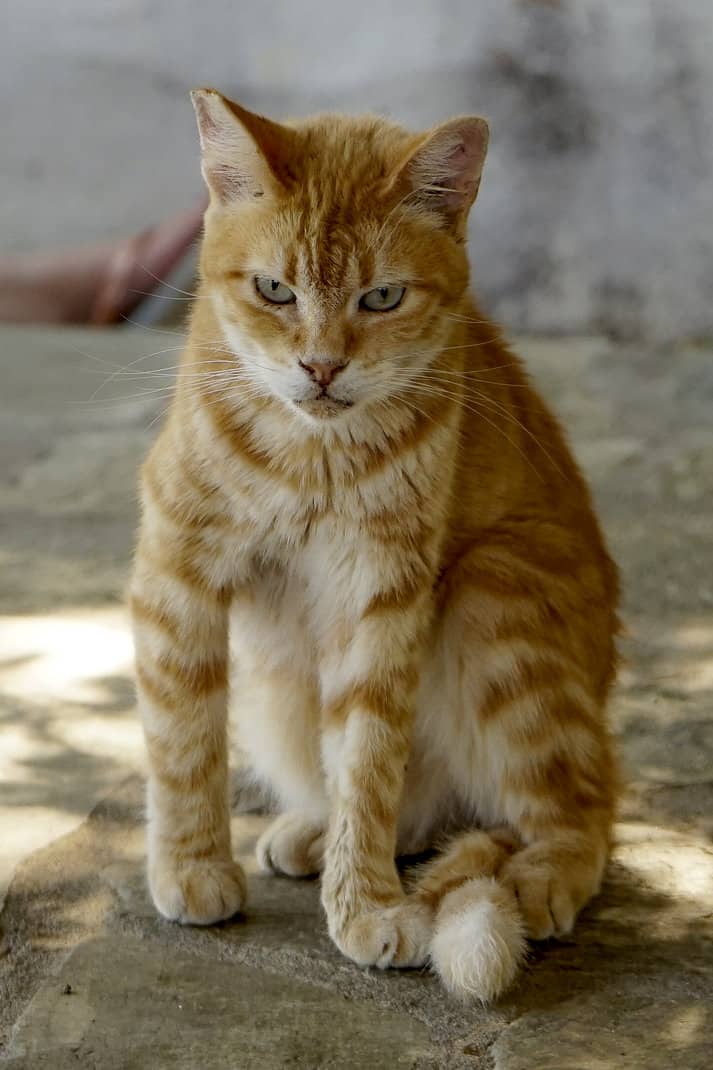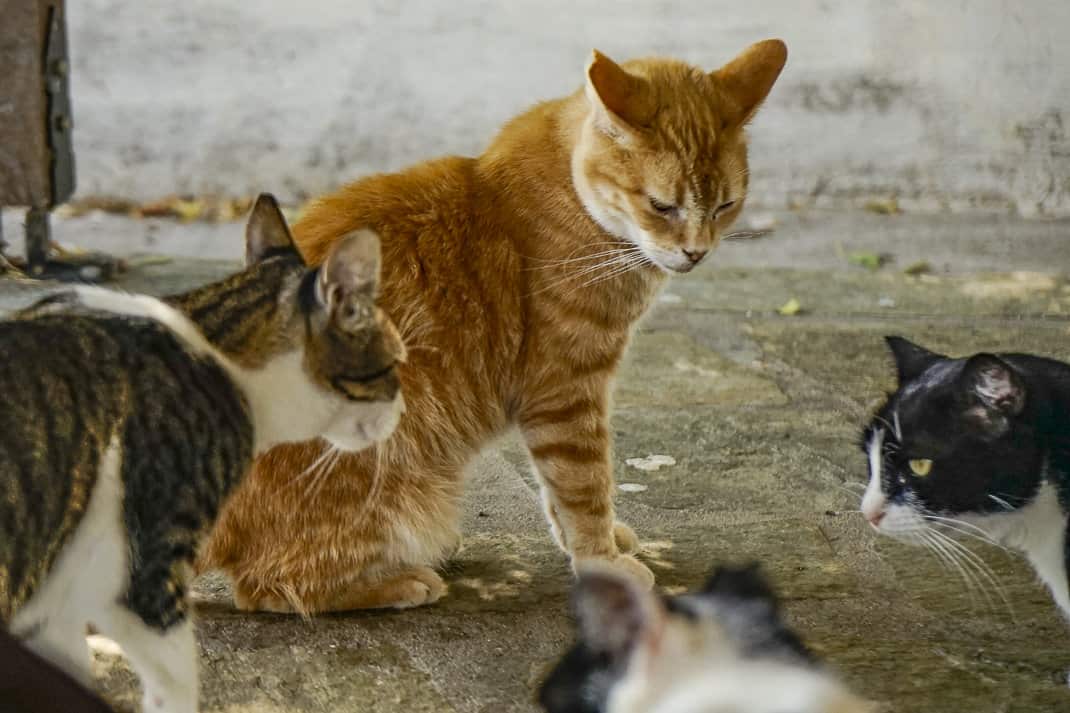Bolt revisited: The dying kitten we saved thriving in Greece

SKIATHOS, Greece – How Marina and I named the dying kitten we saved in Greece six years ago is a story in itself. Anyone who has followed this blog knows the story. We found him in a rain gutter on the island of Skiathos. His tiny head was buried on the back of his front paws. He was motionless.
I was sure he was dead. Marina picked him up and, shockingly, it moved one of its back legs. As it turns out it was his only good back leg. And he was just waiting to die. We nursed him overnight and then took him to the Skiathos Cat Welfare Association where Sharon Hewing saved his infected leg and his life. That night, Marina suggested a name.
“Hussein,” she said.
“Hussein?” I exclaimed. “You want to name a kitten after a murdering dictator?”
“No!” she said. “OOH-sain! After Usain Bolt. Because of his leg.”

I get it. Usain, in hopes that some day he’ll run like the fastest man in the world. But to prevent confusion, we instead called him Bolt. Well, Bolt is 6 years old now and the name is appropriate. No, he doesn’t run a 9.58 100 meter dash.
Every time you try and touch him, he bolts.
Bolt’s current health
That’s fine. Wednesday Marina and I had our second reunion with the kitten that touched so many readers’ lives when I wrote about him in 2016. He’s healthy, happy and, most importantly, alive right where we dropped him off with his life in the balance.
We made our annual August trip to Greece’s Sporades Islands and took a 75-minute ferry ride from our base in Skopelos to Skiathos. Olivia, a volunteer at the welfare association, picked us up at the dock and took us to Bolt’s home on a cliff with a seaview even a cat could love.
Bolt was the first cat we saw. He was basking in the brilliant sunshine next to the wall in the driveway. In our first reunion three years ago, he regarded us like we were both pit bulls. I approached slowly.
Unlike those National Geographic videos of lions cuddling with long-lost handlers on their return, Bolt did not jump into my arms in a lightning flash of recognition and gratitude . He looked at me with bored eyes and quickly, well, bolted. He showed remarkable agility with his right rear leg reduced to only a hanging bone and paw from the infection long ago.
Welfare association moves
In fact, Bolt is so agile with three legs, welfare association handlers couldn’t catch him when they moved their 200 cats down the road three years ago.
Some refused to leave. Bolt was one of them.
“We tried for a couple weeks but we’d put down the drop cage and he was gone,” Olivia said. “He’s quick.”

Sharon’s ex-husband, Peter, now takes care of Bolt and about 15 others. When we entered they were all hanging around his patio with varying degrees of affection, ranging from Bolt’s cautious indifference to borderline sexual assault.
Bolt has plenty of furry friends. He’d curl up with one, rub his head against another. Meanwhile, a young cat jumped on my lap and tried seducing me by rolling over on his back and licking my fingers. I saw Bolt cleaning himself.
Our encounter
Marina said, “Bolt, remember me? I saved you.”
Maybe Bolt doesn’t understand accented English.
She approached slowly, quietly, with her hand outstretched, hoping for just a touch. Bolt was gone like Usain out of the blocks. It turns out, the only time we ever touched him was six years ago when he curled up in our arms as a dying kitten.
“Some cats are like that,” Olivia said. “He could be wary of humans.”
Marina and I weren’t upset, frustrated or sad. Our only hope when we arrived was that Bolt is healthy and happy. He is. Peter has done a wonderful job taking care of him when he’s not taking tourists out on his sailboat.
Peter takes over
I first asked Peter about Bolt’s leg. He doesn’t appear in any pain but it remains elevated when he walks. It never touches the ground except when he sits.
“The leg has been the same all his life, as long as I’ve known him anyway,” Peter said. “He gets around. He runs up and down when he wants to. So he’s fine.”
Peter gives him fresh chicken every morning (“Lots of protein,” Peter said.) and then he goes outside where he spends all day with his friends. Peter is apparently the only person who has touching privileges. That’s odd. I’ve always read that saved cats and handicapped cats often return more affection to the people who show rare affection to them.
Bolt gets his affection from other cats.

“He’s affectionate with me,” Peter said. “He’s not a cat that likes to come and sit on your knee. He’s OK. I can pick him up. Comes in the morning, eats his breakfast and stands by the door to go out. He’s got a nice routine.”
When we returned home from saving Bolt in 2016, Marina told me, “When you save a cat, you save the world.” But after saving a cat, it needs a happy home. Many do not have one. According to Petfinder, the largest online cat adoption agency in North America, “less adoptable” cats take four times longer to find homes.
Marina and I are overjoyed that Bolt has had a happy home from Day 1 of his second life. He won’t need seven others.


August 16, 2022 @ 9:38 am
So sweet! Thank you for saving Bolt and doing your part to save the world!
August 16, 2022 @ 10:22 am
Thanks for this report. I have a friend from N California who raises money each year and takes it to Skiathos and these cats. I think she’s been going there for at least 20 years!